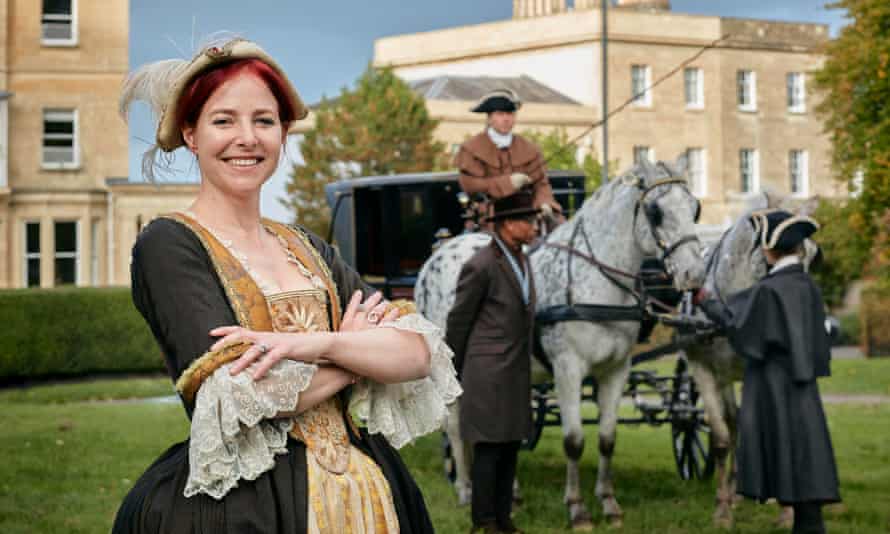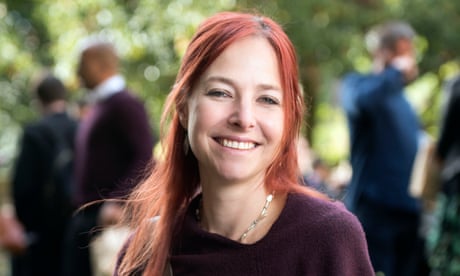The quotations in the book, which come from ancient philosophers such as Epicurus and Mencius through to contemporary literary figures including Margaret Atwood, Zadie Smith and Wole Soyinka, are intended to show that humanism “is not a new idea, but has a deep history going back thousands of years”.
She has not been impressed with the government’s handling of the Covid crisis: “The most gentle way of saying it is they could have done better. OK, they are dealing with something that is completely novel, but there has been a failure of policy making and communication. At the beginning of the pandemic, I started out wanting to give the government the benefit of the doubt. But their erosion of public trust has left me doubting them very much indeed,” she says. Prof Alice Roberts, the broadcaster, scientist and author, has been filming this week for the third series of Channel 4’s Britain’s Most Historic Towns, after a five-month gap. “The last time we were out, back in March, people were pulling the shutters down around us. We felt very nervous. I drove home that evening, and stayed there,” she says.
Humanism is a general philosophy or framework for life, rather than a movement or an organisation that people join, she says. But Humanists UK is “extremely needed”. The organisation helps train humanist celebrants, supports people across the world who are persecuted for their non-religious beliefs, and “provides a much-needed voice for humanism”, she says.
The pandemic has led to people asking questions about the meaning of life and death, and what really matters to them. “In the past, people were more likely to turn to religion in times of crisis than look to other sources of guidance,” Roberts says. “But there has always been an alternative – the humanist approach – and in the UK today, where most people are now not religious, that alternative is more relevant than ever.”
Roberts, who became president of Humanists UK last year, says she has come across many people who, on learning about humanism, say: “That’s me! That’s what I think, I just didn’t know there was a name for it.”
Despite the hiatus in filming, Roberts has been remarkably productive during lockdown and its long tail. Her first children’s book, Human Journey, a story of ancestral migration, will be published this week, while a “much bigger book”, Ancestors: A History of Britain in Thirteen Burials, going back to the depths of the Ice Age, is due out in early 2021.
The C of E also plays a huge role in the education of children, with a million children in its schools and increasing involvement in multi-academy trusts; Roberts says she suspects the church’s influence over the curriculum will continue to grow. Education has been an area of some controversy for Roberts, who has always been open about sending her own children, aged seven and 10, to a local C of E primary.
She hopes the book will be a “lovely introduction” to the ideas of humanism for those thinking about humanist ceremonies to mark life’s big events, such as marriage, birth and death.
At the heart of humanism, says Roberts, is the “idea that humans can be deeply moral beings without having some external source of goodness to either impel or encourage them to behave well. Living a good life comes from you, from employing your own human faculties of reason and empathy and love.”
“I live in a rural area, and my children weren’t offered places at non-faith schools, so I didn’t have a choice. I was very open with the school about my humanist beliefs, and I’ve been a school governor. I haven’t withdrawn my children from assembly as it felt divisive to remove them from the occasions when the whole school gets together,” she says. “But they say prayers in the classroom, which isn’t something that should be happening in the 21st century. It goes beyond being taught about Christianity to indoctrination.”
“There’s been no investment in more space or teachers in schools, so many children – and of course, teachers – are going back to normal class sizes, in poorly ventilated classrooms, with inadequate social distancing and unclear, inconsistent guidance on face coverings. Teachers and heads are clearly doing their best in a difficult situation. I think everyone’s anxious, aren’t they?”
“Today people who hold these beliefs and values are called humanists. There are millions of individuals around the globe who share this way of living and looking at the world – even if they haven’t heard of the word ‘humanism’ and realised that it describes what they believe.”
“I found there was a lot of fantastic writing on humanism but it tended to be quite hefty tomes,” she says. “I like those books that you have lying around and dip into, that offer a bit of inspiration. So Andrew Copson [the chief executive of Humanists UK] and I cooked up a plan to produce this little guide.”

Roberts has also found time to co-author The Little Book of Humanism, a pocket-sized guide to the meaning of life and death scattered with quotations, mini-meditations and illustrations, published last week.
Her children are returning to school this week, a move which Roberts views with some anxiety as three of her family of four are asthmatic. “We know that reopening schools will increase transmission of the virus. Most people don’t have space in their houses in which they can isolate themselves if they’re vulnerable – and of course, some families will have members who are extremely clinically vulnerable, and who have been shielding.
“These people have looked to scientific evidence and reason to understand the world. And they’ve placed human welfare and happiness – as well as the welfare of other sentient animals – at the heart of how they choose to live their life.
“Religion still carries immense political weight in the UK, despite the steep fall in the proportion of people who define themselves as religious,” she says. The UK is the only country in the world apart from Iran that reserves places in its legislature for clerics, with 26 Church of England bishops sitting by right in the House of Lords. “And yet we think of ourselves as a progressive nation!”



